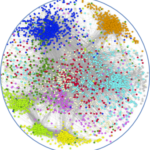Lien vers Pubmed [PMID] – 30692194
Lien DOI – 10.1534/genetics.118.301768
Genetics 2019 Apr; 211(4): 1179-1189
High-throughput measurements of molecular phenotypes provide an unprecedented opportunity to model cellular processes and their impact on disease. These highly structured datasets are usually strongly confounded, creating false positives and reducing power. This has motivated many approaches based on principal components analysis (PCA) to estimate and correct for confounders, which have become indispensable elements of association tests between molecular phenotypes and both genetic and nongenetic factors. Here, we show that these correction approaches induce a bias, and that it persists for large sample sizes and replicates out-of-sample. We prove this theoretically for PCA by deriving an analytic, deterministic, and intuitive bias approximation. We assess other methods with realistic simulations, which show that perturbing any of several basic parameters can cause false positive rate (FPR) inflation. Our experiments show the bias depends on covariate and confounder sparsity, effect sizes, and their correlation. Surprisingly, when the covariate and confounder have [Formula: see text], standard two-step methods all have [Formula: see text]-fold FPR inflation. Our analysis informs best practices for confounder correction in genomic studies, and suggests many false discoveries have been made and replicated in some differential expression analyses.




